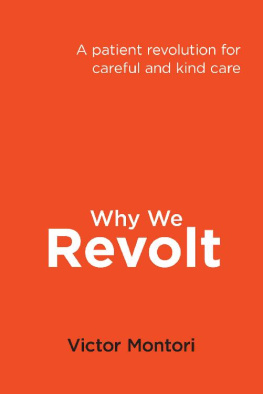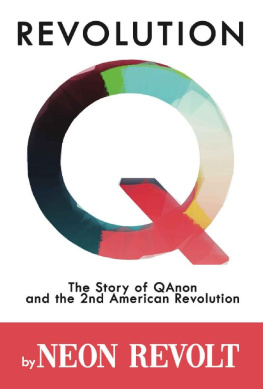Victor Montori - Why we revolt: A patient revolution for careful and kind care
Here you can read online Victor Montori - Why we revolt: A patient revolution for careful and kind care full text of the book (entire story) in english for free. Download pdf and epub, get meaning, cover and reviews about this ebook. year: 2017, publisher: The Patient Revolution, genre: Home and family. Description of the work, (preface) as well as reviews are available. Best literature library LitArk.com created for fans of good reading and offers a wide selection of genres:
Romance novel
Science fiction
Adventure
Detective
Science
History
Home and family
Prose
Art
Politics
Computer
Non-fiction
Religion
Business
Children
Humor
Choose a favorite category and find really read worthwhile books. Enjoy immersion in the world of imagination, feel the emotions of the characters or learn something new for yourself, make an fascinating discovery.
- Book:Why we revolt: A patient revolution for careful and kind care
- Author:
- Publisher:The Patient Revolution
- Genre:
- Year:2017
- Rating:4 / 5
- Favourites:Add to favourites
- Your mark:
- 80
- 1
- 2
- 3
- 4
- 5
Why we revolt: A patient revolution for careful and kind care: summary, description and annotation
We offer to read an annotation, description, summary or preface (depends on what the author of the book "Why we revolt: A patient revolution for careful and kind care" wrote himself). If you haven't found the necessary information about the book — write in the comments, we will try to find it.
Victor Montori: author's other books
Who wrote Why we revolt: A patient revolution for careful and kind care? Find out the surname, the name of the author of the book and a list of all author's works by series.
Why we revolt: A patient revolution for careful and kind care — read online for free the complete book (whole text) full work
Below is the text of the book, divided by pages. System saving the place of the last page read, allows you to conveniently read the book "Why we revolt: A patient revolution for careful and kind care" online for free, without having to search again every time where you left off. Put a bookmark, and you can go to the page where you finished reading at any time.
Font size:
Interval:
Bookmark:
Why We Revolt
A patient revolution for careful and kind care
Victor Montori
Published by
The Patient Revolution
Rochester, Minnesota, U.S.A.
Copyright 2017 by Victor Montori
All rights reserved.
Paperback edition October 2017
ISBN: 0999394819
ISBN-13: 978-0999394816 (Patient Revolution, The)
Advanced praise for Why We Revolt
We revolt because our health our very lives matter. Why We Revolt does not serve as a blueprint but as an inspiration for patients and clinicians who are ready to pry open the idea of healthcare and make it about actual health and care. This book is a necessary catalyst for conversations that will revolutionize patient care.
Kerri Sparling, diabetes patient advocate and creator of sixuntilme.com
This profoundly humanistic examination of what has gone wrong in medicine has the diagnosis just right. This book is for everyone who will ever be a patient, for every health professional, and for every administrator and policy-maker.
Gordon Guyatt, physician and researcher, father of evidence-based medicine
I went into medicine to interact with real, unique, emotive humans. Why We Revolt brings healthcare back to this primary love of and care for patients.
Sara Segner, medical student
Montori begins with a gut punch that stays with you throughout this powerful, sobering, eye-opening book. After expertly diagnosing the roots of industrial healthcare problems, he passionately plots a patient revolution. Policy makers, clinicians, patients, and journalists should set aside the very little time needed to absorb this gem and learn from its lessons.
Gary Schwitzer, journalist and publisher of healt h new s review.org
If someone gave you this book, they were probably hoping to advance a patient revolution.
I hope you can do the same.
Keep this copy, get another one, and give it to someone else.
To share your stories or send me a note:
on Twitter.
To review notes and links to online resources for each chapter:
patientrevolution.org/whywerevolt
To join and contribute to The Patient Revolution: patientrevolution.org
Thank you, and take care.
V
Contents
To my sons
Introduction Revolt
Orwell proposed that one must write, among other reasons, to see things as they are, to find out true facts and store them up for the use of posterity. This book arises from my need to do just that. And what I see is that healthcare has corrupted its mission, it has stopped caring, and I am not going along with it. It is time for a patient revolution to bring about careful and kind patient care for all.
This book also documents my sense of what is wrong about industrial healthcare. Industrial healthcare fails to notice patients. It standardizes practices for patients like this , rather than caring for this patient . Efficient specialization and narrow job definitions drive industrial healthcares focus toward organs, diseases, or test results. Rigid protocols and fear of deviating from them miss the person. Systems that prioritize access and volume place very little value on the length and depth of the interaction between patients and clinicians. Forcing encounters to be brief and shallow speeds patients through consultations in which clinicians cannot appreciate their patients situation clearly. Failure to notice is also the effect of encounters bloated with industrial agendas, such as documentation and billing, which draw attention away from patients and toward the computer monitor, distracting from care to document it.
How does care then take place when the patient is unnoticed, sometimes nothing more than a blur? Judging from the stories that clinicians and patients tell, care happens almost by mistake, when someone takes exception to or ignores protocols. In the absence of these accidents, of these caring mistakes, the industry is capable of harm through unintentional cruelty. As it makes care accidental and cruelty incidental, industrial healthcare marches on to produce fortune and power. By focusing on its industrial goals, healthcare forgoes caring.
The harm is not only to patients. Industrial healthcare is killing the healers soul. Enforced productivity depletes clinicians. Under efficiency pressures, clinicians cannot draw meaning from fleeting patient visits. They cannot get support from sped-up colleagues. They feel abused and without love and unable to love. Burnout, divorce, and suicide become inherent to the work of health care, the healers curse. Industrial healthcare has stopped caring for both patients and clinicians, everyone at the frontline.
Many of my patients, my family, and I have benefited greatly from the wonders of modern healthcare: expert surgical teams, clean and efficient facilities with the necessary equipment, carefully organized services that collaborate and coordinate, well-trained professionals who cordially attend to the sick and invest each one with dignity. All this is possible. It happens, just not routinely or by default. This is the should be that I have the great fortune of enjoying on good days.
On bad days, this should be lurks between tightly scheduled slots, in the furtive half-smile of another clinician rushing on to their next patient, in the sigh of the staff who had hoped to give more prompt service. It screams from the notes I get from family members or their friends asking for a second opinion or telling their stories, some of them horrific tales of perfect medicine for the wrong person or for the wrong problem. It pulls at my heart when I see what has happened to the patient in front of me: files filled with the results of tests and procedures, 12 medications, multiple specialists, and notes that reveal that no one ever stopped to notice. On many days, I am afraid I am that clinician, that cog of the machine, the one who fails to notice.
Simply noticing and acting on what is noticed makes patients more likely to receive care that makes intellectual, emotional, and practical sense to them care that responds to their needs and is consistent with their views of the world and their lives. This is care that recognizes and respects that patients may need to devote their scarce time, energy, and attention to matters that compete in priority with the administrative and self-care tasks healthcare has delegated to patients. This is care that responds with competence, science, creativity, and humanity to advance each patients situation without overwhelming patients or creating new ills.
The words in these chapters, I hope, will ignite in you the urgent need to join us in destroying the difference between what is and what should be . In abolishing accidental care and incidental cruelty. In making care the intentional end of our work, not the means to achieve industrial goals. In ensuring our best medicine reaches everyone who needs it. Clinicians, anyone honored by the possibility to care, must notice and act toward each person in need of their care. They must appreciate each persons circumstance, concerns, contexts, biology, and biography. To appreciate each patient, the clinician must throw moorings that, for a moment, partner the boats. Traversing rough waters unhurriedly, elegantly, together, patient and clinician can, with compassion and competence, co-create a trajectory for the patient that advances her particular situation. Such careful and kind care for all must be the end result of a patient revolution.
This book is organized as a series of essays. Part One discusses the ills of industrial healthcare, the targets of the revolution: cruelty, blur, burden, and greed. Part Two discusses some antidotes: elegance, solidarity, love, and integrity. The remainder concern careful and timeless care. The book concludes with images of a revolution of conversations and the cathedrals of care that it will build.
Next pageFont size:
Interval:
Bookmark:
Similar books «Why we revolt: A patient revolution for careful and kind care»
Look at similar books to Why we revolt: A patient revolution for careful and kind care. We have selected literature similar in name and meaning in the hope of providing readers with more options to find new, interesting, not yet read works.
Discussion, reviews of the book Why we revolt: A patient revolution for careful and kind care and just readers' own opinions. Leave your comments, write what you think about the work, its meaning or the main characters. Specify what exactly you liked and what you didn't like, and why you think so.











